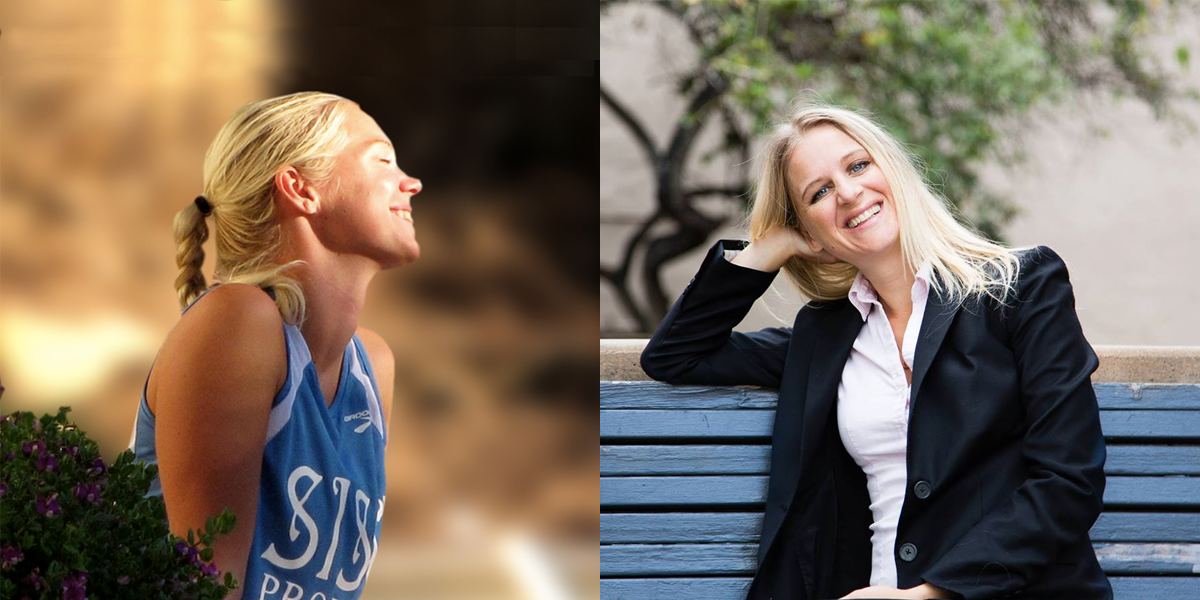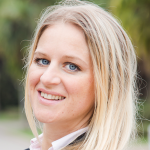Recently Dr. Emma Seppälä, author of The Happiness Track, sat down with Emilia Lahti to discuss her pioneering research on the Finnish concept of “Sisu.” Lahti is a researcher and entrepreneur with a focus on positive psychology. She’s studied under Martin Seligman and MacArthur Fellow Angela Duckworth. Currently, she’s training to run the length of New Zealand to raise awareness about the global prevalence of violence within families.
Emma Seppälä: You’ve done a lot of research on the Finnish concept of Sisu. Could you define Sisu?
Emilia Lathi: Sisu is a word and a concept that people use in different ways. Based on data from over a thousand people that I’ve analyzed, the core of Sisu relates to those moments when we feel like we’ve come to the end of our physical or psychological capacity. When we feel like there’s nothing left in us. The American philosopher, William James, used this construct of a second wind, which is descriptive of what Sisu also represents. Sisu is extraordinary courage and determination in a very tight spot, or when we are facing loss, or trauma, or just some big challenges that we have chosen to take part in. It’s not your daily nuisances of, “Oh, I didn’t find a parking lot next to the door at Whole Foods.” It’s when we face something that feels greater than us.
Emma: Sisu is a Finnish term and it’s very difficult to translate. If you had to translate it, what are some words you would use?
Emilia: The closest ones would be… guts. It relates to its etymology, actually. Sisu comes from the word sisus, which means something interior. It’s used to refer to something that’s inside of a human or an animal — a very strong, intense emotion. But Sisu encompasses much more than that, so even guts is not sufficient. Guts, courage, determination, the ability to move through adversity, even when you think you’ve reached the breaking point.
Emma: In psychology, we talk about how research is often “me-search.” There’s a personal element that inspires you to pursue a topic. Is there something that triggered your interest in Sisu?
Emilia: If I look back now, it feels like almost everything in my life prepared me for doing this.
Trending: Best Happiness Books of 2025 (So Far)
When I was a child, I went through several illnesses, and I spent years of my childhood in a hospital. That’s one part of it. Then, in my adulthood, I ended up in a relationship with someone who was physically and mentally abusive. That experience really changed everything for me. When it was finally over, I was psychologically in a very, very bad place, and it led me to ask, how do humans overcome extreme adversities? I wanted to understand what is it that allows us to heal from those experiences and even, sometimes, grow.
As you know, post-traumatic stress is very well known and common. But there is also an abundance of research on post-traumatic growth. Dr. Richard Tedeschi is one of the groundbreaking researchers on that topic. He noticed that when humans go through adverse situations, when they start healing, they don’t come back to the baseline — they actually go beyond. They grow as a result of it. We can see the same phenomenon in human physiology. When you work out a muscle, the body repairs itself so that it’s stronger for the next time you lift that 20 pound weight.
As a result of my experience, I quit my job working for the Finnish Foreign Mission and went back to school to study psychology. I felt like I needed to find a way to contribute to the world. I was lucky enough to survive and I had the resources to start the journey to healing. I later met this amazing man who is now my husband who’s played an incredible part in my well-being and healing.
Sisu wasn’t a part of my quest at first; it came as a result of attending the amazing Angela Duckworth‘s class at University of Pennsylvania when I was considering applying for an Applied Psychology program there. Angela spoke about grit during her lecture, and that reminded me of Sisu… We have this construct at home in Finland; what did it mean? What do we know about it? To my astonishment, I couldn’t really find a definition for it. It was elusive. People couldn’t really say whether it’s some kind of a character trait, a tendency? Is it something only Finns have? Does it even exist? Those questions led me to explore it and it’s been a journey. I never anticipated everything that has happened.
Emma: What would you say to someone who’s listening who may be going through a really hard time physically or emotionally right now? Maybe they’re at rock bottom. Maybe they’re in a situation where they’re looking for answers. From your research and all the research you’ve read regarding post-traumatic growth, what would you want to share with this person?
Emilia: I would respond by saying — and this relates to what I see as the philosophical underpinning of Sisu — there is so much more strength to us than what meets the eye at a given moment, and more to us than we can often even imagine. When going through those really hard times, what I found useful is to look back at the narrative of our lives. What we discover is, “Wow, I have a pretty good track record in overcoming hard moments in my life.” Because we have them all the time, right?
But we rarely stop and give gratitude to ourselves for being so strong. What I do sometimes is this funny little gratitude practice that a fellow math graduate at UPenn named “Darling Sweetheart.” It’s just: “Darling, sweetheart, you have come a long way. Thank you for being there for me.” By doing so, we remind ourselves of all the amazing things that we have actually managed to overcome.
Spiritual practice has also been very important to me. I would recommend everyone find whatever it is that helps their soul heal. It’s different for different people.
Combine that with understanding how the human mind works. There is a thing called the negativity bias, for example. We are more prone to lean toward the negative events and focus on them because of evolutionary reasons—we’re hardwired to look for information that is useful for survival.
Emma: From one study I read, every day three times more positive things happen to us than negative things, and yet, it’s so easy for the mind to get caught up in that negative. Gratitude can help counter that.
Trending: Why Rest is the Biggest Productivity Hack for Your Brain
Emilia: Social support is hugely important, too. It comes up in my data all the time. I’m passionate about breaking the myth of this self-sufficient Sisu person who alone conquers and overcomes. We are all part of this social network of humans. Our power to help each other heal is absolutely extraordinary. From the moment we’re born, we reach out to other people. Having those nurturing connections around us is the number one requirement for a balanced life.
Research shows that we function better when we have a positive sense of our place in the universe and work from positive emotions. We even have better access to our cognitive skills. If you want to do well in, let’s say, a job interview, it’s important to have that positive narrative about yourself. That inner voice will help you succeed better than “I need to overcome something,” or “I need to succeed.”
Emma: In The Happiness Track, I wrote about the fact that we are so hard on ourselves and we think that self-criticism somehow leads to better performance. Of course, we should know the areas that we need to improve in, but when you’re constantly self-critical, you’re actually self-sabotaging yourself. You cannot grow. It’s as if you constantly had someone on your shoulder telling you how you’re not good at anything. In that moment, it’s so difficult to learn from the mistakes, grow from experiences, and so forth.
I want to add, for building that inner resilience, the research that I did with veterans coming back from war with trauma showed that training our nervous system to be calmer through breathing practice can really benefit you. When you’re calmer, you’re able to handle situations better.
Emilia: I’m so happy you mentioned that. It’s almost like this handle you can switch on. Before we started this conversation, we sat down for a moment and just focused on breathing, to get grounded and concentrate on what we are actually here to do.
Emma: One of the questions that comes in this day and age, when there are a lot of demands coming at us and we need to perform no matter what: how do we have that Sisu, that determination and strength to move through it, but at the same time, not burn out? How do we avoid getting to that extreme point where maybe it’s too much for your body, mind, et cetera.
Emilia: I consider this one of those million dollar questions. The answer is actually pretty simple, but living it is surprisingly hard. It comes back to asking the question of what are our values? I would even ask, what’s the purpose of life? What is the reason we’re here and what do I want to contribute?
Trending: How to Break Free From the Ambition Trap
It’s our responsibility to make sure that we know what we believe. Are humans good or bad, for example? Whichever premise we function from will manifest itself through our actions. Our actions create the reality, and the world, and the future that we live in.
I would go back to ancient Greek philosophy, the saying to know thyself. For me, it has been this enduring quest to find that peace within me. Now that I’m comfortable with sometimes letting go of things, as opposed to running around and finding those things that allow me to validate my existence on this planet. I think when we do too much, it emanates from that unease.
I saw a quote on Facebook some time ago that we must stop the glorification of busy. I truly think that we must. It’s up to us to take that personal leadership. This is the hard part. The path to that space is hard.
Emma: Especially if everyone around you is glorifying busy. I was interviewed by a journalist who said, “There’s this healthcare company. They’re doing this test for all incoming leaders, and everyone who scores high on empathy, kindness, generosity and agreeability basically gets thrown out of the group of potential candidates. Do you think this is a great way to go about running a business?”
All this flies in the face of the research.Research shows that leaders who are kinder, more passionate, more supportive, more humble, more agreeable, and more able to bring people together to listen to other people are actually going to have a much better organization. But people are still working according to that old model of dog-eat-dog.
I was at an Eileen Fisher event yesterday giving a workshop, and one of the women came up to me after and said, really nicely, “People are people whether you put them together in an organization or not. Just because they work in a corporation or organization, it doesn’t not make them people. And fundamentally, as people, we value positive social relationships, kindness, and compassion.”
This article has been condensed and edited for clarity.




























